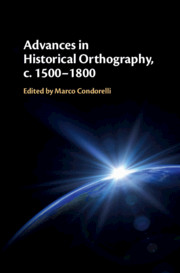Book contents
- Advances in Historical Orthography, c. 1500–1800
- Advances in Historical Orthography, c. 1500–1800
- Copyright page
- Contents
- Figures
- Tables
- Contributors
- 1 From the Early Modern Era to an International Research Area
- 2 A Phonological–Graphemic Approach to the Investigation of Spelling Functionality, with Reference to Early Modern Polish
- 3 Graphematic Features in Glagolitic and Cyrillic Orthographies
- 4 The Emergence of Sentence-internal Capitalisation in Early New High German
- 5 Punctuation in Sixteenth- and Seventeenth-century French and Spanish Grammars
- 6 Orthographic Variation and Materiality of a Manuscript Pre-standard Lithuanian Spellings in Simonas Daukantas’s ‘History of the Lithuanian Lowlands’ (1831–4)
- 7 Investigating Methods Intra-textual, Inter-textual and Cross-textual Variable Analyses
- 8 Orthography and Group Identity A Comparative Approach to Studying Orthographic Systems in Early Modern Czech Printed and Handwritten Texts (c. 1560‒1710)
- 9 Orthographic Solutions at the Onset of Early Modern Croatian
- 10 Women’s Spelling in Early Modern English
- 11 Towards a Relativity of Spelling Change
- 12 Synergic Dialogue in Historical Orthography National Philologies, Comparability and Questions for the Future
- Bibliography
- Index
2 - A Phonological–Graphemic Approach to the Investigation of Spelling Functionality, with Reference to Early Modern Polish
Published online by Cambridge University Press: 02 November 2020
- Advances in Historical Orthography, c. 1500–1800
- Advances in Historical Orthography, c. 1500–1800
- Copyright page
- Contents
- Figures
- Tables
- Contributors
- 1 From the Early Modern Era to an International Research Area
- 2 A Phonological–Graphemic Approach to the Investigation of Spelling Functionality, with Reference to Early Modern Polish
- 3 Graphematic Features in Glagolitic and Cyrillic Orthographies
- 4 The Emergence of Sentence-internal Capitalisation in Early New High German
- 5 Punctuation in Sixteenth- and Seventeenth-century French and Spanish Grammars
- 6 Orthographic Variation and Materiality of a Manuscript Pre-standard Lithuanian Spellings in Simonas Daukantas’s ‘History of the Lithuanian Lowlands’ (1831–4)
- 7 Investigating Methods Intra-textual, Inter-textual and Cross-textual Variable Analyses
- 8 Orthography and Group Identity A Comparative Approach to Studying Orthographic Systems in Early Modern Czech Printed and Handwritten Texts (c. 1560‒1710)
- 9 Orthographic Solutions at the Onset of Early Modern Croatian
- 10 Women’s Spelling in Early Modern English
- 11 Towards a Relativity of Spelling Change
- 12 Synergic Dialogue in Historical Orthography National Philologies, Comparability and Questions for the Future
- Bibliography
- Index
Summary
This chapter encourages a reflection on the relationship between ‘tradition’ and ‘innovation’ in the study of diachronic orthography. The author works with structuralist oppositions and systemic representations of the language (graph–allograph representations of language) and refers to the theoretical paradigm proposed in the structuralist framework to compare different editions of a text. The author analyses the spelling systems of two editions of Baltazar Opec’s Żywot Pana Jezu Krysta (The Life of our Lord Jesus Christ) and proposes an integration of the traditional model with a discussion of socio-historical factors, in order to provide insights into the functionality of spelling systems in Early Modern Polish.
Information
- Type
- Chapter
- Information
- Advances in Historical Orthography, c. 1500–1800 , pp. 16 - 45Publisher: Cambridge University PressPrint publication year: 2020
